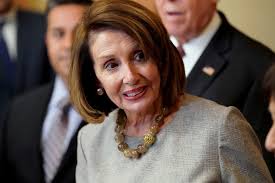- Nancy Pelosi announced Tuesday that she’ll run for reelection to her San Francisco-based House seat.
- The 81-year-old House speaker was first elected to Congress in 1987.
- Pelosi was expected to run for reelection, but there is wide speculation she’ll retire from her leadership post.
Speaker Nancy Pelosi of California on Tuesday announced that she would run for reelection to the House of Representatives, ending speculation that she might retire from the lower chamber as she is set to leave leadership at the end of the current Congress.
“While we have made progress much more needs to be done to improve people’s lives,” the 81-year-old lawmaker said in a video statement. “This election is crucial — nothing less is at stake than our democracy.”
She continued: “But we don’t agonize, we organize. I am running for re-election to Congress to deliver for the people and defend democracy.”
The speaker listed core Democratic issues — including improving access to healthcare, maintaining reproductive rights for women, creating middle-class union jobs, and battling the effects of climate change — as reasons why she is seeking another term in Congress. She is currently serving her 18th two-year term in the chamber.
Pelosi was first elected to the House in a 1987 special election to succeed the late Rep. Sala Burton and rose through the ranks of leadership. She became the first woman to lead a political party in Congress — as House Minority Leader — in 2003.
After the 2006 midterm elections — which saw Democrats take back control of the House after 12 years in the minority — she became the first female speaker in US history.
During Pelosi’s first stint as speaker from 2007 to 2011, she was instrumental is shepherding then-President Barack Obama’s legislative agenda through Congress after his 2008 election, scoring major legislative wins including passage of the Affordable Care Act and the American Recovery and Reinvestment Act.
After Democrats lost the House majority after the 2010 midterms, she served as minority leader and continued to keep the party unified despite lacking the power to control the floor in the GOP-led chamber.
When Donald Trump assumed the presidency in 2017, Pelosi became a key foil in keeping Democrats on the offensive against the conservative administration — and led the party to a House majority in the 2018 midterm elections.
As part of a deal made with several of the party’s more moderate members, Pelosi agreed to serve for no longer than four additional years as speaker, which would set the stage for a new generation of leadership in the House.
House Democratic Caucus Chairman Hakeem Jeffries of New York is seen as the frontrunner to succeed Pelosi in leadership after the 2022 midterms, but her announcement today revealed her intention to continue serving her constituents in Congress even if she isn’t holding the speaker’s gavel.
Read the original article on Business Insider














